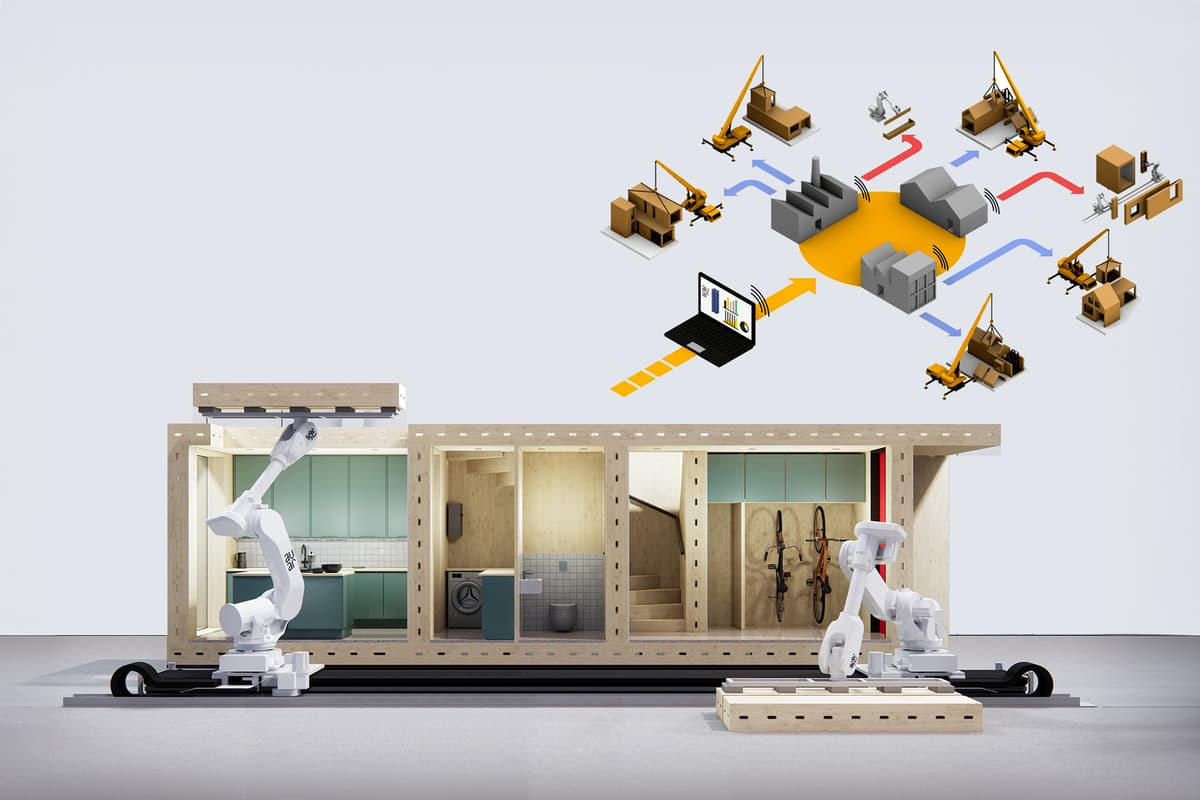$300,000 robotic micro-factories pump out custom-designed homes
AUAR's end-to-end tech stack basically means you can have a fully-functional microfactory. The first 40 microfactory roll-out is just beginning but when it's all rolling
By Mike Hanlon
AUAR's end-to-end tech stack basically means you can have a fully-functional microfactory. The first 40 microfactory roll-out is just beginning but when it's all rolling, the intention is to be able to set up such a microfactory and have it functioning inside a week! AUAR's growth rate is planned at about 50% YoY until 2027.
The construction industry is also the most inefficient, least digitized and most polluting industry (37% of ALL emissions), so change is imperative from macro economic necessity alone. For the builders of the world faced with a jigsaw puzzle of partial digital solutions and chronic labor and supply chain issues, the margins are growing ever-thinner and the necessity is to change or perish.
British company Automated Architecture (AUAR) has a thoroughly ingenious solution and it has enlisted an all-star cast of financial backers in short order: Morgan Stanley, ABB Robotics, Rival Holdings (USA), Vandenbussche NV (Belgium) with VCs such as Miles Ahead and Bacchus Venture Capital (Jim Horowitz et al) helping to get the initial idea off the ground.
AUAR partners with home builders and contractors in Europe and North America, licensing its micro-factory and all the digital technology to build low-energy homes at the price of normal homes, at any scale. The idea is to provide the tools to empower local ecosystems of communities, contractors, architects and developers to build better homes.
AUAR licenses the company’s low CapEx robotic micro-factories and the entire tech stack required to run them, with prices starting at $300,000 plus an ongoing licensing fee. Their licensees will be existing home builders, who will be able to build homes more cost-efficiently at any scale. AUAR's customer profile is a home builder with a minimum of £20m turnover per year. There's about 3,000 of these potential customers across EU and North America.
Given robots don't need sleep or pay and work considerably faster than humans (who are in chronic short supply), AUAR’s building system is expected to cut labor costs by 30% and supply chain, transport and logistics costs by 80%.
“The average home has about 7000 parts, each with a different supply chain,” says AUAR's co-founder and CEO Mollie Claypool. “We have one primary material, and only a few supply chains.”
“There is an urgent need for affordable low-energy homes, but building high-quality, sustainable timber homes is hard to scale, and AUAR intends to change that. Robots and AI allow us to deliver high-quality housing at significantly lower costs, increasing margins and productivity while lowering the cost for the end users. By using our solution, construction companies can hit their sustainability targets at a cost they are comfortable with.”
Each $300,000 AUAR micro-factory enables an approximate USD $1.3 million per year revenue creation opportunity for home builders, removing the barriers to the widespread adoption of robotics in the construction industry.
AUAR's system is already being deployed, with the first micro-factories opening in Europe last month, and conversations underway with potential partners in Canada, Spain, Sweden, Portugal, France and the Netherlands.
AUAR's first partner in the United States will be Indiana-based Rival Holdings, a company that emerged in 2023 with the merger of two already strong companies with the same vision. Ambassador Supply and VIA Developments formed one company to better enable their intention to operate at the forefront of change in the American construction industry, and AUAR was one of the company's first investments. Rival might be new in name, but it already operates 16 companies in 10 states, with over 800 employees.
Rival CEO Brad Crawford explained the creation of the venture company thus: “As our industry grows and evolves, it is critical that we focus on technology, innovation and disruption. Rival is a company that will work to catalyze innovation and growth, through a holistic view of the real estate and construction industry, and a willingness to take risks and explore possibilities.”
Folk singer Brendan Daniel picks up where Oliver Anthony left off, exposing the big secret of the "Rich Men North of Richmond": that "government" is a technique of inter-generational organized crime to rob and control populations. The song was inspired by the book: "Government" - The Biggest Scam in History... Exposed! - How Inter-Generational Organized Crime Runs the "Government," Media and Academia by Etienne de la Boetie2, founder of the Art of Liberty Foundation.



